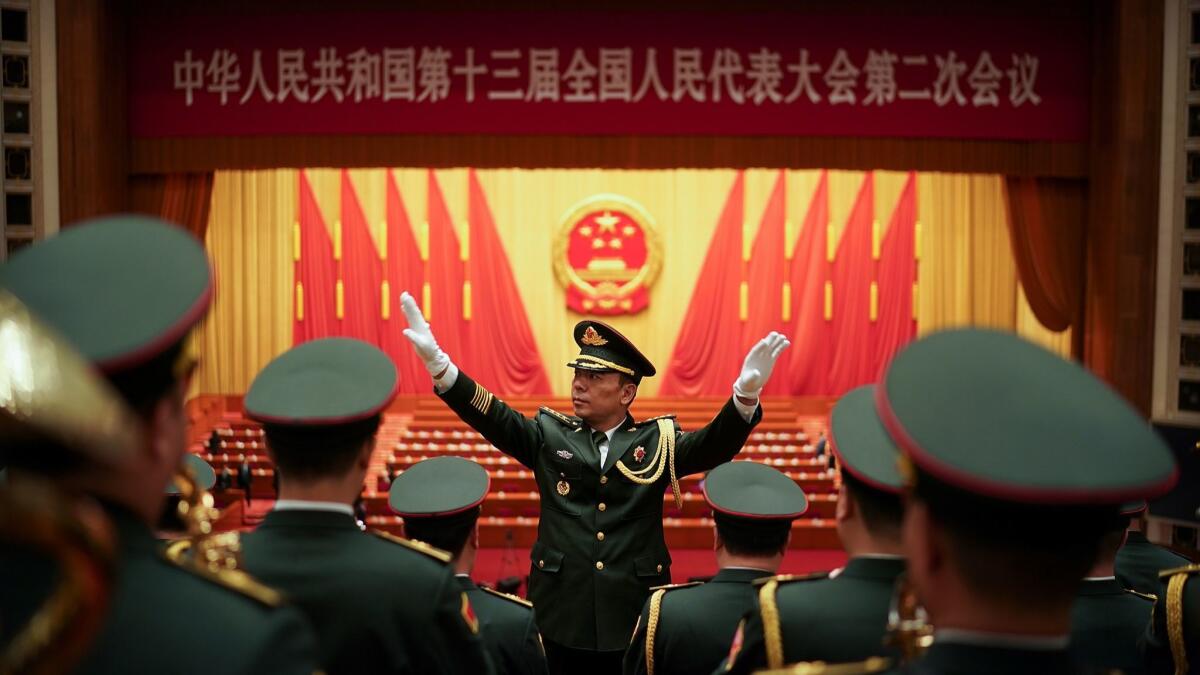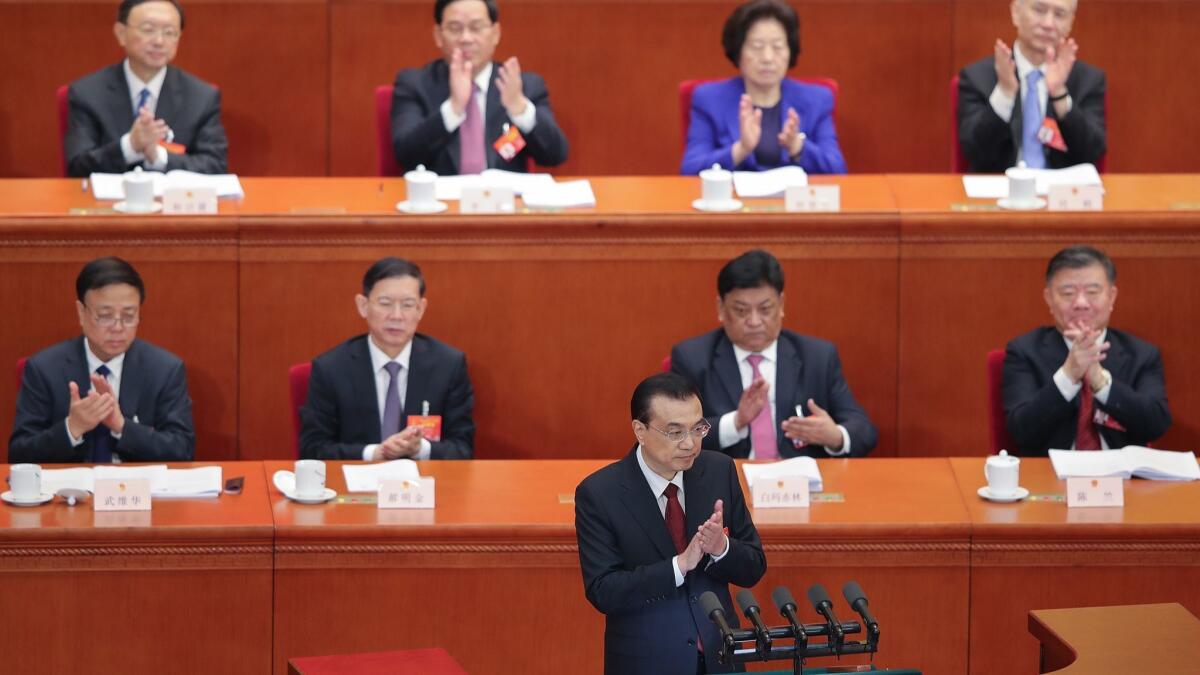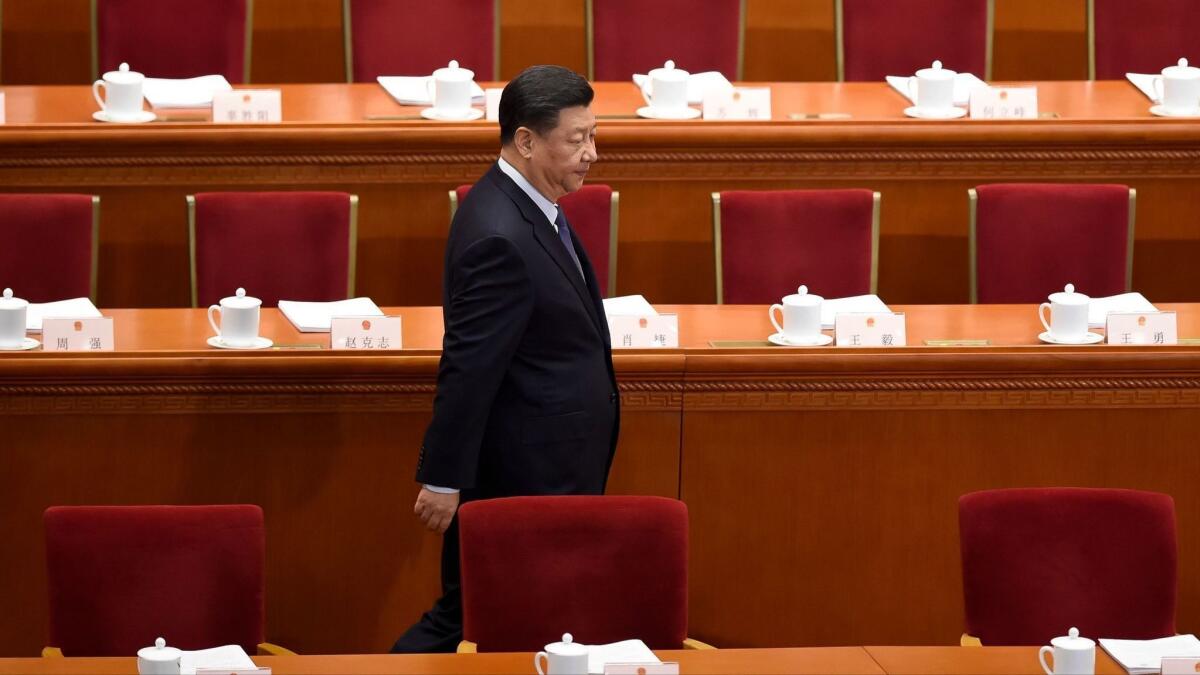China’s surprisingly frank admission at National People’s Congress: Its people are dissatisfied

- Share via
Reporting from Beijing — The warnings from Chinese Premier Li Keqiang were unusually stark: China faces difficulties “of a kind rarely seen in many years.” The economy is slowing and faces further downward pressure.
And perhaps most sobering for the nearly 3,000 delegates to the National People’s Congress who listened to his address on Tuesday: The people of China are unhappy with the government’s performance in many ways.
“There is still public dissatisfaction in many areas such as education, healthcare, elderly care, housing, food and drug safety and income distribution,” Li said, in a rare admission for a senior Chinese leader. The government is juggling a slowing economy with rising public demands for better services, a clean environment and an end to corruption and wrongdoing in government and food and drug companies.

China is also grappling with a trade war with the United States, a $34-trillion debt burden and enduring inequality between wealthy cities and the rural poor. It faces skepticism from both foreign and Chinese businesspeople about its economic direction and its commitment to open its market to global competition — a key issue for Washington in the trade war.
Li announced a lower growth target for China — a range of 6% to 6.5% compared with 6.6% last year — in a keynote speech at the opening session of China’s largely ceremonial parliament, but ruled out an aggressive stimulus package in favor of tax cuts.
The speech, akin to a state of the nation address, underscored China’s contradictory objectives: slashing taxes but increasing spending on rural schools and hospitals, social support payments, transport infrastructure and the military. The government also aims to provide 11 million new jobs and lift more than 10 million people out of poverty and cut air pollution.
In an unusually frank summary, Li admitted that China’s business environment has fallen short of what business expects and admitted that Chinese innovation is weak.
The speech also highlighted the anxiety at the heart of Chinese leadership over the potential for economic problems to fuel social unrest.
“Only alertness to danger will ensure safety,” Li said. “Instability and uncertainty are visibly increasing and externally generated risks are on the rise.”
Li promised to improve market access to foreign firms doing business in China and to protect their intellectual property, a core Washington demand in the talks designed to end the trade war, amid reports a trade deal is close.
Huang Shouhong, director of research at the State Council and the leader of a group that wrote Li’s report, said at a briefing that many people were unhappy about the government’s past failures to implement policy.
He noted that the word “reform” was mentioned 105 times in the report and the term “opening up” appeared dozens of times. He said that was designed to send the message that China was committed to becoming a market-based economy open to international business.
Huang said the drafting committee had consulted with more than 332,000 Chinese via online surveys, including ordinary citizens and businesspeople.
The key piece of legislation due before the National People’s Congress — which almost never rejects bills — is China’s new foreign investment law, which the government says would prevent foreign companies from being forced to surrender their intellectual property to Chinese partners.
Li studiously avoided any reference to the government’s Made in China 2025 policy — its central ambition to emerge as a global leader in 10 key high-tech sectors — which triggered alarm in Washington and contributed to trade tensions. The policy is key to China’s plan to transform from a nation based on low wages and the mass production of cheap goods to a superpower that dominates in areas including robotics, rocket science, aeronautics, driverless cars and artificial intelligence.
Instead of the words “Made in China 2025,” Li’s speech contained a surprising admission: “Our capacity for innovation is not strong and our weakness in terms of core technologies for key fields remains a salient problem.”
The change in direction could be a strategic retreat, concealing the country’s emerging strengths rather than proclaiming an ambition to challenge America’s global dominance in high-tech areas. Elsewhere in the government report, there were references to China’s intention to pursue an “innovation-driven development strategy” and to improve the “innovation ecosystem,” but there was no 2025 deadline.
The speech also made multiple references to moves to protect military veterans, after a series of angry veterans’ protests last year, and to crack down on crooked drug companies, after a scandal over bad vaccines sparked demonstrations by shocked parents last year.
This year’s focus on “risks” and problems contrasted sharply with last year’s Congress, when the tone was upbeat and focused on President Xi Jinping’s rise. Xi’s grip on power remains unchallenged since the Congress last year endorsed a move to ditch term limits on the presidency, opening the way for him to rule indefinitely.
Li’s speech Tuesday referred repeatedly to Xi’s role as the “core” of the ruling Communist Party, suggesting that the president is unlikely to leave power for the foreseeable future. Li called on delegates to “follow the guidance of Xi Jinping thought,” in a reference to a vote last year that enshrined Xi’s thinking into the party’s constitution, elevating him to a status similar to that of Mao Tse-tung, who founded the People’s Republic of China 70 years ago this October.
In an annual show of political theater, delegates clapped in rhythm as Xi strode onto the stage in the Great Hall of the People.

Since he became China’s leader in 2012, Xi has sharply centralized power, removed political rivals, cracked down on dissent, appointed allies to key military positions and ramped up internet censorship. Authorities have jailed human rights activists and lawyers, detained an estimated 1 million minority Muslim people in the western Xinjiang region, and launched a sweeping anti-corruption campaign that saw 621,000 government officials punished last year.
He also moved to increase the control of the Communist Party over society, increase mass surveillance of the population and usher in a system designed to punish or reward people based on their “social credit,” including blocking their access to high-speed transportation or higher-ranked schools.
The National People’s Congress is designed to showcase Chinese “democracy,” although the state lacks multi-party popular elections and independent institutions free of Communist Party control. In the days beforehand, activists and dissidents are routinely removed from Beijing by security officials, and security on the streets and in public transport hubs is intense.
Li’s words about “risks” echoed warnings from Xi in January about a rocky path ahead for China, and appeared partly directed at tamping down the public’s expectations that China’s years of extraordinary economic growth could last forever.
Chinese policymakers have striven not to allow growth to fall below 6%, but in a rare admission, Huang said China’s growth figure “does not matter,” and a lower growth was “acceptable” as long as targets on jobs and high incomes were met.
Li called for frugality in government, warning repeatedly against waste, bureaucracy, hedonism, extravagance and “formality for formality’s sake.” He said China’s resources must be directed to the neediest people such as the elderly, the rural poor and struggling small businesses.
In coming decades China will face some tough structural problems, most notably the impact of the one-child policy that will leave a shrinking workforce burdened with the support of an aging population.
With China facing severe environmental degradation of land and rivers, Li announced measures to boost green energy and improve environmental conservation. But efforts to clamp down on air pollution have had mixed results, with some factories forced to close their doors in recent months because of environmental demands, increasing pressure on the economy.
More to Read
Sign up for Essential California
The most important California stories and recommendations in your inbox every morning.
You may occasionally receive promotional content from the Los Angeles Times.










